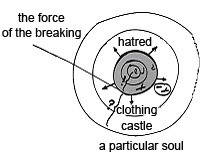An Upside-Down World
 Our perception of reality is divided into inner Kelim and outer Kelim. The inner Kelim are called “root,” “soul,” and “body.” We perceive them as our “self” and take care of them. The external Kelim are called “garments” and “castles” and are sensed as belonging to someone else, and therefore opposite to our inner Kelim.
Our perception of reality is divided into inner Kelim and outer Kelim. The inner Kelim are called “root,” “soul,” and “body.” We perceive them as our “self” and take care of them. The external Kelim are called “garments” and “castles” and are sensed as belonging to someone else, and therefore opposite to our inner Kelim.
The more we love our inner Kelim, the more we hate the outer Kelim. We always separate the two and evaluate one against the other.
There is a border or a breakage between the inner and outer Kelim; we look outward from behind that border with the perspective of: How can I use everything for my own benefit? Therefore, we always look at others egoistically and with hatred. The worse others are doing, the better we feel.
The power of the breaking creates this separation, and as a result, we enjoy our own fulfillment as well as others’ lack of it. We always evaluate our condition according to the border that lies between us and the rest of the world – the worse the world is doing, the better off we are (as long as it doesn’t threaten our personal security).
We are built in such a way that we are frightened only if we hear about tragedies that can affect us personally. If they can’t affect us directly, then we’re glad to hear about them. We always evaluate ourselves against others, meaning, against the external Kelim (“garments and castles”) that seem foreign to us.
An “outsider” is not just someone I don’t care about, but more so – someone who hurts me by being successful and well off. If I earn ten thousand a month while others around me earn only five thousand, then I feel great! But if someone else earns twenty thousand, it causes me disappointment. I am not calmed by having everything I need; it’s also important that others have less. This gives me additional fulfillment, since I am fulfilled when they don’t have something that I do.
People like to hear about tragedies that happen in the world because it makes their own condition seem better, and they hate to hear that someone else won or earned something. In other words, we are not indifferent to the external Kelim, and they still belong to us. However, in our current perception, they belong to us in an “upside down,” opposite form. The more we have a “plus” inside, the more others possess a minus.
This is the result of the power of the breaking, the splitting of the Kelim. There once was a screen above the Kelim that connected them together, but when it broke, a reverse, upside down, world emerged. In it, the bigger people’s egoism, the larger the separation into “me versus the world,” and the greater the distance between people.
When people experience suffering, it forces them to sense their egoism less in order to suffer less. That is why suffering brings people together. When people experience similar kinds of suffering, they join together to reduce their personal misery. In these cases the desires of others are sensed more closely because they’re similar to our own and we know that the same misfortunes might befall us.








Discussion | Share Feedback | Ask a question